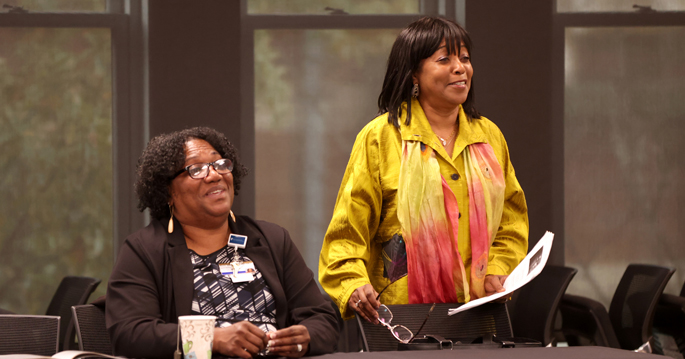
Nurse leaders from eight states in either clinical practice or academic medicine came together from Nov. 14-18 at Vanderbilt University School of Nursing (VUSN) for the inaugural Academy for Diverse Emerging Nurse Leaders.
The academy, a joint effort of VUSN and VUMC, is a new leadership development program for nurses new to health care leadership and academic positions who are from groups historically underrepresented in nursing and/or those who support them. The program is intended to reach nurses who have been in their leadership roles for less than three years, equipping them with the tools to navigate the unique challenges of being leaders with diverse backgrounds.
“I think it is a once-in-a-lifetime opportunity for emerging diverse nurse leaders to come together, to develop networking opportunities or peer-to-peer opportunities, and gain information from leadership experts within the nursing discipline and from other disciplines as well,” said academy co-director Rolanda Johnson, PhD, MSN, RN, associate dean for Equity, Diversity and Inclusion at VUSN.
The weeklong program was filled with guest lectures, panels and activities facilitated by leaders from diverse backgrounds. For example, one of the sessions, and a subsequent Dean’s Lecture, featured Rumay Alexander, EdD, RN, Vanderbilt alumna and professor at the School of Nursing at the University of North Carolina at Chapel Hill.
Alexander’s lecture featured real world examples of how to deal with discrimination and prejudice in the workplace in addition to addressing racism and inequities in the health care system that has led to historical distrust in minority communities.
“I challenge you to use your voice,” she told the small group, which was limited to 20 participants. She encouraged the academy to actively listen and dialogue with others, be aware of one’s own unconscious bias, and call out inequities when they happen.
“We as nurses can be a big part of that solution,” she said, leading to “quality care and better outcomes for our patients.”
The impetus for the program is twofold, said academy co-director Mamie Williams, MPH, MSN, RN, FNP-BC, senior director for Nurse Diversity and Inclusion at VUMC. The first is that evidence shows that nurses from diverse backgrounds lack support they need to succeed in their roles, she said. The second is to increase the number of diverse leaders by encouraging them to bring others aboard.
“Ultimately what it leads to, what it’s been shown to lead to from the evidence, is having diverse leaders helps the institution to attract and recruit other diverse staff,” Williams said. “In turn, that ensures that workforce mirrors our patient population, which we know helps to improve patient outcomes.”
The impact of the conference goes far beyond a week in November. Each of the participants was assigned a mentor in their home institutions and another outside, someone with national presence, Johnson said. In addition, each participant will develop and implement a project in their home institution.
Participants said they felt empowered by the week, both by the topics and being around their peers.
“For me, it was validating to feel what other people are experiencing,” said Jemima Amankwah, RN, nurse manager of emergency mental health at UMass Memorial Health in Worcester, Massachusetts. “It’s not just me. How do I exert my power in this space?”
Eugenia Trammell-Goldsby, MSN, RN, nurse manager of the Transplant/GI Unit at UMass Memorial Health in Worcester, Massachusetts, said the academy was helping her to become a stronger, more proficient leader. “I want to gather that knowledge and be able to take that back with me,” she said.












